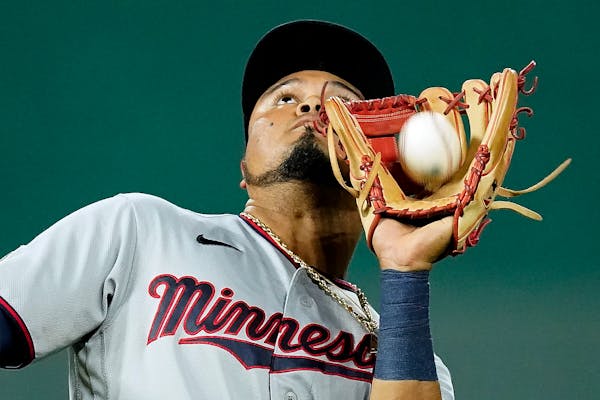KANSAS CITY, MO. — A dreary, frustrating Twins season finally comes to a close on Sunday, and Byron Buxton, limited by an oblique strain and a broken hand to playing in fewer than 40% of their games, is excited. "I'm pretty pumped," he said.
Wait, wait — it's not the ending that has him charged up, but a beginning. Because as annoying as the injuries were, as difficult as it was to miss more than three months of baseball, Buxton believes some big things changed in 2021: His production. And his future.
That second part isn't entirely up to him, and Buxton has only increased his value, his potential price tag this season. He is eligible for free agency 13 months from now, but said a new contract, which the Twins and his agents tried to negotiate in July, isn't on his mind yet.
"I'm sure they're probably still talking. I'm not too much in on that," though he is "keep[ing] the door open," Buxton said. Being traded instead has "obviously crossed my mind, but it's nothing I've worried about. The only uniform I know is the Minnesota Twins. It's the only thing I really cared about."
Well, that and being a better ballplayer. And that's where 2021 was especially exciting.
"Hitting-wise, that's something I always could do. I did it through the minor leagues, and that's what got me here," Buxton said of his seventh major league season. "It took me a little longer than I wanted to get where I wanted to be, but … I'm positive and I'm confident."
With good reason. Buxton, the Twins' ninth-place hitter through much of his first five seasons, in 2021 became the Twins' toughest out and most feared hitter. His .996 OPS, albeit in too few at-bats to qualify, would rank with Vlad Guerrero Jr. as the American League's best. His .637 slugging percentage is explained by his 18 homers in only 60 games, and his 39 extra-base hits rank fifth on the Twins; the only players ahead of him have played at least twice as many games.
"It's a treat to watch," manager Rocco Baldelli said. "It's one thing to hit the ball hard. There are a lot of guys in this league who have some snap in their bat, and can really drive the ball and hit the ball hard. It's another thing to go out there against major-league pitching and be on the fastball, be on the breaking balls, and today, even on the changeups."
The power even surprises Buxton, the result, he said, of getting older "and starting to understand a little bit better what I can do in the batter's box."
But what really motivates Buxton is his belief that he can sustain, perhaps even improve, that production with what he intends to do next.
"This year taught me a little bit about myself and who I can become, not just on the field but off. Off the field is where you get better and smarter as a player," he said.
Buxton has hired a nutritionist to help him tame the inflammation that results from the workouts he intends to put himself through. He's a big believer in year-round preparation now, as opposed to three years ago, the last time he spent more than half a season on the injured list.
"Back then, I didn't really take working out serious. I didn't like working out. Didn't care to work out. I wanted to play baseball, but I didn't really know a routine to be a true baseball player, you know?" Buxton said. "That was more of a self-realization. If I wanted to get better, I've got to put in more work to be better."
As always, health is the key to Buxton's impact, and going down with an oblique strain just a week after wrapping up a historically great April — eight home runs, a .426 batting average and a 1.363 OPS — was particularly frustrating. He is comforted somewhat, however, by the realization that the injuries weren't self-inflicted, that he didn't run into a wall or overextend himself on the bases.
His hand was broken by a pitch by Cincinnati's Tyler Mahle — "just stuff I couldn't control," he said. "This year was more mentally draining because I couldn't control the injuries … [but it helped] me get mentally strong."
